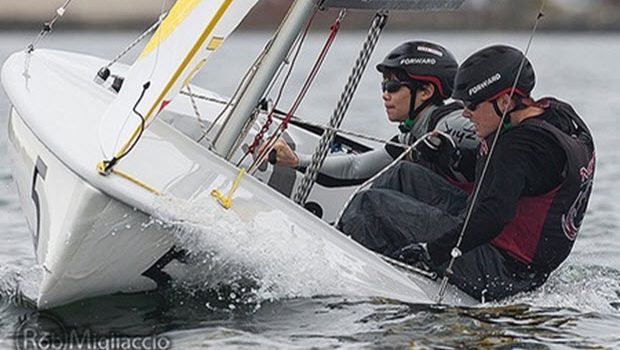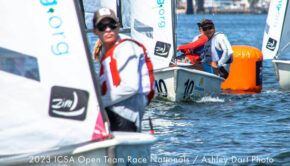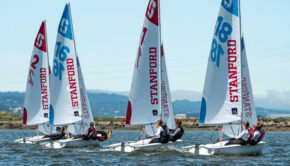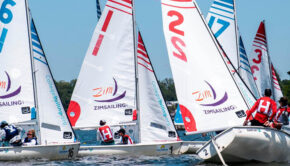Hard Work and Love of the Game
Published on April 12th, 2017
For the first time in the history of the MIT sailing program, the team has qualified for Team Racing Nationals on May 27-29. As one of the original college sailing teams, Coach Matt Lindblad shares what it took to win at the top level.
I have been very lucky to be a part of some successful team racing squads, from St. Mary’s teams in the late 1990’s, when team racing was on port triangles with no umpires, to some great post college teams and recently some good keelboat teams. The biggest difference I’ve found between the teams that meet their goals and the teams that don’t is love of the game, patience, and continued effort.
Team racing well is a culmination of individual boats putting in the time to become great individually, and then those boats putting in the time as a team to become great collectively. In the case of all of the successful teams I have been a part of, this means surviving some absolute heartbreak and crushing defeats, analyzing and practicing the nuances of the game, and then at some point the wins come.
Sometimes, the difference between a team that wins and a team that loses is almost imperceptible because team racing is such a marginal gain type of game.
This group at MIT didn’t do anything dramatically different at the national’s qualifier (The Fowle Trophy) than they did at any of the other regattas in years’ past. But at each practice and debrief, we put a lot of thought and work into what we are trying to do and how it all works together. This particular group has been the hardest working team, collectively, that we’ve coached here. There is a real growth mindset approach that has been adopted by the group.
In collegiate sailing, one of the biggest gaps between programs is the gap between teams that qualify for Team Racing Nationals with regularity and those that haven’t in years. Teams that qualify extend their team racing season and collective knowledge by 5 or 6 weeks with a highly competitive regatta at the end. Even if a team goes every other year, this knowledge gets carried forward to the next generation.
For our Class of 2017 sailors, it’s been a building process since their freshman year, and collectively our team has practiced really hard and challenged each other on the water and in the gym to be great and to close that gap. We hope this accomplishment validates our hard work and love of the game and will help us become a team that expects to contend at Team Racing Nationals every year.
The entire Tufts team, the umpires, and Ken Legler did an amazing job at hosting the qualifier. I think everyone walked away thinking this was exciting team racing at its finest. Umpiring makes the game infinitely more fun; you walk away with respect for your competition intact and races are won and lost on the water, not in the room.
Without umpires, team racing would not be nearly as fun and the NEISA (New England Intercollegiate Sailing Association) umpiring crew is awesome. Win lose or draw, you always know that the racing was fair, which is a great change from college racing 20 years ago when the regattas were decided in hour long protests and lots of bad blood between teams.










 We’ll keep your information safe.
We’ll keep your information safe.